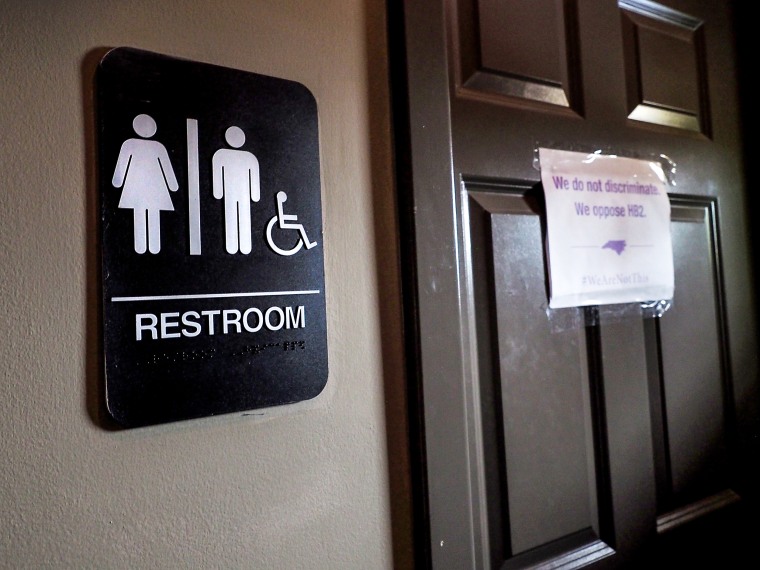A federal choose struck down a Tennessee law on Tuesday that might have required companies within the state to publish warning notices on their public restrooms if they’d insurance policies permitting transgender patrons to make use of the amenities that match their gender id.
The American Civil Liberties Union challenged the law in June on behalf of two enterprise house owners — the proprietor of Sanctuary, a performing arts and group middle in Chattanooga, and the proprietor of Fido, a restaurant in Nashville, amongst different companies.
The law went into impact on July 1, however Judge Aleta A. Trauger of the U.S. District Court for the Middle District of Tennessee issued a preliminary injunction in opposition to it per week later. Then on Tuesday, Trauger completely blocked the law by granting the ACLU’s movement for abstract judgment, which asks a courtroom to determine a case with out a full trial.
In her 40-page determination, she wrote that the law violates the First Amendment as a result of it compels speech that’s controversial and with which the plaintiffs disagree.
“It would do a disservice to the First Amendment to judge the Act for anything other than what it is: a brazen attempt to single out trans-inclusive establishments and force them to parrot a message that they reasonably believe would sow fear and misunderstanding about the very transgender Tennesseans whom those establishments are trying to provide with some semblance of a safe and welcoming environment,” Trauger wrote.
Glenn Funk and Neal Pinkston, each district attorneys basic; Christopher Bainbridge, director of code enforcement; and Carter Lawrence, the state’s fireplace marshal, are named as defendants within the lawsuit and haven’t returned a request for remark. A consultant for Gov. Bill Lee has additionally not returned a request for remark.
The law required enterprise house owners with even a casual coverage that permits individuals to make use of whichever bathroom they wish to publish a sign that reads, “This facility maintains a policy of allowing the use of restrooms by either biological sex regardless of the designation on the restroom,” on the entrance of single-sex public restrooms, locker rooms, dressing areas or different amenities which might be “designated for a specific biological sex … where a person would have a reasonable expectation of privacy.”
The law acknowledged that the sign be at the very least 8 inches huge and 6 inches tall and use the colours pink and yellow, with boldface font, amongst different necessities.
Representatives for the state argued that Tennessee’s law is a “content-neutral” rule meant to make clear restroom signage and isn’t meant to be an endorsement of how gender id ought to be understood, in keeping with the opinion. The ACLU’s purchasers, they argued, have “imagined an idiosyncratic, hidden undertone to the [required] signage.”
But Trauger disagreed, noting that the federal government’s most well-liked view of how gender works — that it’s dictated by “biological sex,” which is assigned at delivery and is restricted to male or feminine — is contested.
“The only thing that is imaginary in this case, though, is the imagined consensus on issues of sex and gender on which the defendants seek to rely,” Trauger wrote. “Transgender Tennesseans are real. The businesses and establishments that wish to welcome them are real. And the viewpoints that those individuals and businesses hold are real, even if they differ from the views of some legislators or government officials.”
The ACLU and its purchasers celebrated the choice Tuesday.
“We applaud the court for recognizing that this law violates the First Amendment and harms transgender people,” Hedy Weinberg, ACLU of Tennessee government director, mentioned in an announcement, in keeping with a news launch. “Transgender individuals should be able to live their lives free of harassment and discrimination. Today’s decision ensures that the businesses who welcome them are not forced to become instruments for politicians’ discrimination.”
Bob Bernstein, proprietor of Nashville restaurant Fido, has a casual coverage that allowed prospects to make use of the restroom that they really feel is most applicable. He mentioned he has not had any complaints or issues in regards to the coverage and objected to the “stigmatizing” message the law required.
“As a former journalist, I believe strongly in free speech,” Bernstein mentioned in an announcement. “The government can’t just force people to post discriminatory, inaccurate, and divisive signs in their places of business. I am glad that the court recognized that this law violates the First Amendment.”


Advocates have described the law as a brand new iteration of “bathroom bills” handed in 2016, similar to House Bill 2 in North Carolina, which sought to bar trans individuals from utilizing the bogs that aligned with their gender id.
The sponsor of Tennessee’s bathroom sign law, Rep. Tim Rudd, R-Murfreesboro, mentioned throughout legislative debate in May that the invoice is supposed to guard girls and youngsters “against sexual predators that could be taking advantage of policies, executive orders or legislation that may allow the opposite sex to enter a restroom, shower or locker room,” the Chattanooga Times Free Press reported.
Trauger wrote in her opinion that Rudd “was unable to provide examples or evidence of such a problem,” although he argued, “[W]e shouldn’t wait for people’s rights to be abused” to doubtlessly stop “an attack.”
The concern is just not new, advocates have mentioned, and proponents of bathroom payments handed in 2016 cited related arguments. But a 2018 research from the Williams Institute at UCLA School of Law discovered there is no such thing as a proof that trans-inclusive insurance policies for public amenities improve security dangers.


